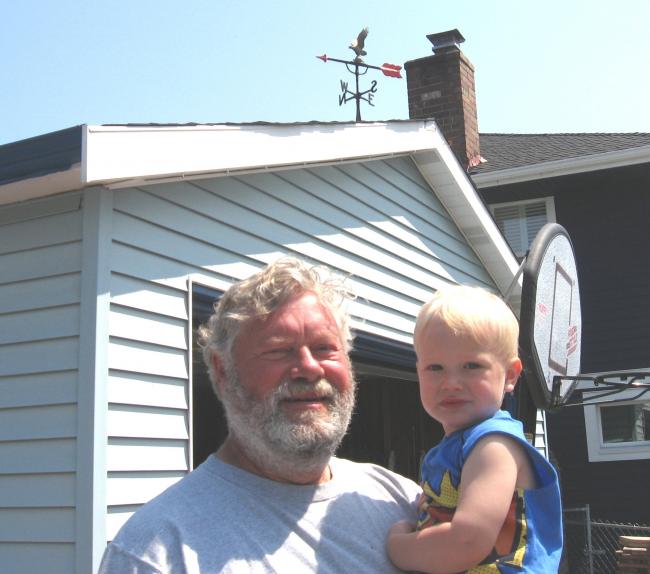At Large in Ballard: The real Rakowski
Duane Rakowski and grandson Tyler Moore.
Mon, 06/15/2009
Although I knocked on the door of the house named “Rakowski’s Roost” to ask about living across from the carved eagle, I realized right away that Duane and Guant Rakowski deserved their own story. For example, how many people in Ballard have first hand knowledge of the entry to every residence in 98107 and 98117 zip codes?
When I first knocked Guant told me that I should talk to her husband Duane about the eagle, but he was on his way to work. When I returned it was their day to watch grandson Tyler, almost 20 months old. Although Duane took the lead on his reminiscences, Guant would chime in with details and clarification.
Duane has lived in a six-block vicinity of his home on 32nd Avenue Northwest for 54 years, and always on 32nd itself. As a child, he lived nearer the Locks until his parents decided to take a closer look at house that had been vacant for two years to the north.
“This is the house,” they realized in 1962. In 1976 Duane bought the house next door which is where he and Guant raised a daughter and son after their marriage in 1981.
Duane’s mother died when she was only 69, but his father lived next to them until he died, “mean and ornery,” at age 84. They still speak fondly of a house that hides its magnitude from the outside. “All mahogany inside,” Duane said. “A huge basement 36 feet long. We had a rec room down there with a pool table.”
Neighbors told them the two corner lots had been used as a local dump in the early 1900s. When someone was ready to develop the lots after World War II they had to dig out years of debris, which led to the inadvertent discovery of cases of dynamite. Old-timers recalled for them how the neighborhood had to be evacuated while a bomb squad from Fort Lawton handled the dynamite.
Duane worked at the Ballard Safeway for 35 years, at the location that is now home to Ballard Commons. He was held up there twice. Once while a box boy in 1964 (with a sawed off shotgun) and the second time almost 30 years later with a 45 to his head.
After retiring from Safeway he began working the variety of jobs that take him to every doorstep in Ballard.
“You have to do something,” he said. “Why not do everything?”
Duane works security for all the Mariners home games. He’s seated Jimmy and Rosalyn Carter and other visiting dignitaries. He escorts all the visiting teams. Closer to home he’s delivered the Ballard News-Tribune for the last 10 years. He was on Phinney Ridge, but he finally got the route that included his own block. In the last year he’s often delivered the paper while pushing his grandson in a stroller.
Then there are the phone books that he and Guant distribute for Qwest. They used to deliver the 98107 zip code area (which they know firsthand has 28 separate mail routes with 500-600 stops per route). One year they also delivered to 98117 but it nearly killed them.
They realized they preferred delivering to 98117. Better parking! The 98107 zip code had gotten too developed and there was no place to park while they went from door to door. “I like Olympic Manor,” Gaunt said. “It has the least mail stops, only 300.”
An eagle in flight on their garage weather vane predates the carved eagle across the street by at least 25 years. Their cat Tabby lounges in the yard on a long leash, carefully avoiding their grandson’s inflatable wading pool. A “Poolroom” sign still hangs in the garage. Duane uses the old pool table when he prepares the phone books.
“It works perfect for wrapping books,” he said.
The talk turns, as it often does, to changes in Ballard since Duane was a child. For him the biggest change was when this Shingle Capital lost its mills. “I watched the mills go,” Duane said, “Some just closed, but I’ll never forget the Seattle Cedar Mill fire in 1958.”
He said the wood was in stacks 80 to 100 feet tall. They used a dry kiln process to heat the water out of the wood, a process also called dry-kill. A combination of dry-kill, wood stacks and railroad cars caused combustion that was like an explosion and went right into the stacks.
“There were people thirty miles away who claimed they could see the glow. The fireboats had to go through the Locks to get to the fire and they couldn’t move out the railroad cars fast enough. The wind was blowing from the north so Fishermen’s Wharf and Interbay were fighting off their own fires from airborne embers.”
“It’s lucky we had a north wind that night,” Duane recalled as though it was last week. “Otherwise Ballard would have been burned to the ground.”
Then Duane grins, a man who appears to know that he has been always been lucky in his Ballard life.


